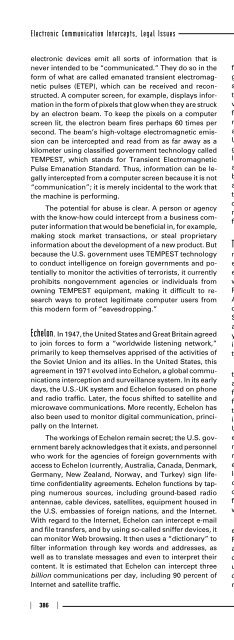ENCYCLOPEDIA OF Espionage, Intelligence, and Security Volume ...
ENCYCLOPEDIA OF Espionage, Intelligence, and Security Volume ...
ENCYCLOPEDIA OF Espionage, Intelligence, and Security Volume ...
You also want an ePaper? Increase the reach of your titles
YUMPU automatically turns print PDFs into web optimized ePapers that Google loves.
Electronic Communication Intercepts, Legal Issueselectronic devices emit all sorts of information that isnever intended to be “communicated.” They do so in theform of what are called emanated transient electromagneticpulses (ETEP), which can be received <strong>and</strong> reconstructed.A computer screen, for example, displays informationin the form of pixels that glow when they are struckby an electron beam. To keep the pixels on a computerscreen lit, the electron beam fires perhaps 60 times persecond. The beam’s high-voltage electromagnetic emissioncan be intercepted <strong>and</strong> read from as far away as akilometer using classified government technology calledTEMPEST, which st<strong>and</strong>s for Transient ElectromagneticPulse Emanation St<strong>and</strong>ard. Thus, information can be legallyintercepted from a computer screen because it is not“communication”; it is merely incidental to the work thatthe machine is performing.The potential for abuse is clear. A person or agencywith the know-how could intercept from a business computerinformation that would be beneficial in, for example,making stock market transactions, or steal proprietaryinformation about the development of a new product. Butbecause the U.S. government uses TEMPEST technologyto conduct intelligence on foreign governments <strong>and</strong> potentiallyto monitor the activities of terrorists, it currentlyprohibits nongovernment agencies or individuals fromowning TEMPEST equipment, making it difficult to researchways to protect legitimate computer users fromthis modern form of “eavesdropping.”Echelon. In 1947, the United States <strong>and</strong> Great Britain agreedto join forces to form a “worldwide listening network,”primarily to keep themselves apprised of the activities ofthe Soviet Union <strong>and</strong> its allies. In the United States, thisagreement in 1971 evolved into Echelon, a global communicationsinterception <strong>and</strong> surveillance system. In its earlydays, the U.S.-UK system <strong>and</strong> Echelon focused on phone<strong>and</strong> radio traffic. Later, the focus shifted to satellite <strong>and</strong>microwave communications. More recently, Echelon hasalso been used to monitor digital communication, principallyon the Internet.The workings of Echelon remain secret; the U.S. governmentbarely acknowledges that it exists, <strong>and</strong> personnelwho work for the agencies of foreign governments withaccess to Echelon (currently, Australia, Canada, Denmark,Germany, New Zeal<strong>and</strong>, Norway, <strong>and</strong> Turkey) sign lifetimeconfidentiality agreements. Echelon functions by tappingnumerous sources, including ground-based radioantennae, cable devices, satellites, equipment housed inthe U.S. embassies of foreign nations, <strong>and</strong> the Internet.With regard to the Internet, Echelon can intercept e-mail<strong>and</strong> file transfers, <strong>and</strong> by using so-called sniffer devices, itcan monitor Web browsing. It then uses a “dictionary” tofilter information through key words <strong>and</strong> addresses, aswell as to translate messages <strong>and</strong> even to interpret theircontent. It is estimated that Echelon can intercept threebillion communications per day, including 90 percent ofInternet <strong>and</strong> satellite traffic.Echelon was formed for the purpose of conductingforeign intelligence operations. Under the Foreign <strong>Intelligence</strong>Surveillance Act, no proof of criminality has to beshown to conduct such operations; the only safeguard isthe secret Foreign <strong>Intelligence</strong> Surveillance Court, whichverifies that the target of an operation is an “agent of aforeign government” rather than a U.S. citizen (or permanentresident alien). Once again, though, the potential forabuse is clear. Many governments have pressured theUnited States to reveal information on surveillance targets<strong>and</strong> intelligence operations conducted through Echelon.They are concerned because of reports that economic<strong>and</strong> business information gathered through Echelon hasbeen passed to American companies, giving them anadvantage over their foreign competitors. In recent years,too, civil libertarians have expressed concern that Echeloncould be used in a way that violates the Fourth Amendment,which preserves the right of American citizens to befree from unreasonable searches <strong>and</strong> seizures.The USA Patriot Act. These developments—the pervasivenessof electronic intelligence-gathering capabilities, theexistence of sophisticated surveillance technologies, theevolution of Echelon—all coalesced on October 26, 2001,when President George W. Bush signed into law the USAPatriot Act, more formally the Uniting <strong>and</strong> StrengtheningAmerica by Providing Appropriate Tools Required to Intercept<strong>and</strong> Obstruct Terrorism Act (Public Law 107–56; 115Stat. 272). The act was passed in response to the terroristattacks against the United States on September 11 thatyear. Its goal was to provide law enforcement <strong>and</strong> theintelligence community with tools to combat internationalterrorism.Even before it was signed into law, the bill was controversial.Its supporters argued that it was necessary inan environment when attacks could emanate not onlyfrom recognized states with identifiable borders but alsofrom loosely affiliated transnational groups such as militantIslamic extremists. These groups, it was pointed out,include American citizens <strong>and</strong> others living inside theUnited States, such as many of the September 11 hijackers.To communicate across national borders, laundermoney, <strong>and</strong> channel funds, these groups rely on phones,radio, <strong>and</strong> especially the Internet, <strong>and</strong> law enforcement’sefforts to monitor their communications were shackled bylegislation that restricted electronic intercepts. The bill’sopponents argued that the act poses significant risk thatcivil liberties will be infringed <strong>and</strong> that it does not providefor legislative <strong>and</strong> judicial overview of the purposes forwhich such information is used.The 342-page USA Patriot Act amends fifteen differentstatutes, including the Electronic CommunicationsPrivacy Act, the Computer Abuse <strong>and</strong> Fraud Act of 1986,<strong>and</strong> the Foreign <strong>Intelligence</strong> Surveillance Act. Many of thechanges are scheduled to expire on December 31, 2005,unless they are extended by Congress. While many of thechanges are minor, they collectively give the Federal Bureauof Investigation (FBI), the Central <strong>Intelligence</strong> Agency386 Encyclopedia of <strong>Espionage</strong>, <strong>Intelligence</strong>, <strong>and</strong> <strong>Security</strong>







![The Big Lie 9-11 and Government Complicity in Mass Murder [PDF]](https://img.yumpu.com/50957077/1/190x245/the-big-lie-9-11-and-government-complicity-in-mass-murder-pdf.jpg?quality=85)








